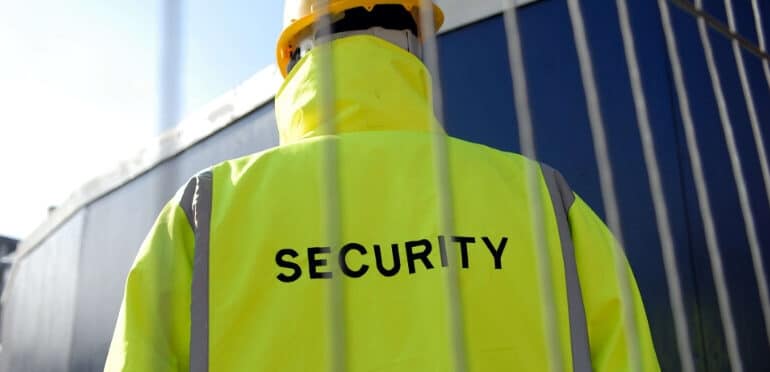Industrial sites, such as energy plants, warehouses, nuclear facilities and oil rigs face diverse security threats. Since many of these sites often house dangerous materials or valuable machinery, they need robust security measures to protect the public and employees from accidents, whilst also deterring common crimes like theft, vandalism, and trespassing.
Depending on the business, operations and location, an industrial site can have many sensitive areas that require heightened security measures such as fences, surveillance systems and on-site personnel who monitor access points. Is an industrial security specialist a good solution? We feel it certainly is… Below however, we’ve detailed some of the most common security threats to industrial settings in our experience.
‘Smash and grab’ burglaries
These burglaries are perhaps more commonplace in the retail sector, however, many organisations in the industrial sector have experienced smash and grab burglaries. This can involve burglars using paving stones to smash windows, scaffolding poles to lever up protective grilles, or power tools to cut padlocks or grilles. In some cases, they take high-value industrial equipment that they can later sell on. In ram-raiding incidents, stolen vehicles are used to ram their way into buildings. As with other crimes involving the misuse of motor vehicles, ram-raiding raises serious public safety issues. The amount of damage caused in each incident also makes repairs particularly expensive.
Employee theft and sabotage
Employers can only do their best to ensure their employees are honest and trustworthy. From employing the right people to instilling a positive culture throughout the workplace, there are many ways to minimise threats from within the organisation, however, internal theft does happen, and it can come as a nasty surprise to find out a once-trusted employee has been stealing from them or had set out to purposely damage the business.
Employees may steal sensitive data from a company to sell on to competitors, steal equipment or cause damage to the company’s equipment to hurt the bottom line. One way in which organisations can combat this crime is by explaining to staff the importance, for example, of keeping a watchful eye for suspicious people or vehicles, even if that is their team members. Any crime against a business can cause disruption and downtime for a company, which can ultimately affect employees, so it’s in the best interests of all industrial firms to consider staff sabotage and employee theft when planning their security strategies.
Sophisticated burglary
Thieves who target machinery for its resale value without knowing precisely what they’re trying to get away with could bring down a whole system. Thieves will at times accidentally set off alarms when breaking into a business at night. Still, perhaps more worryingly, the majority of sophisticated burglars understand how they must cut the signalling of the alarm system, damage exterior lights or disable security cameras with spray paint. With a sophisticated burglary, every detail is planned in advance, with escape routes and vehicles at the ready.
Chemical hazards
Industrial settings tend to involve heavy machinery and large quantities of chemicals that must be stored carefully. The accidental spillage of these substances can lead to environmental problems if small issues are not dealt with quickly. An industrial facility will also be staffed by workers who know their way around the machinery and chemicals, so they can quickly fix any problems that arise. It’s important to remember that corrosive or toxic substances and parasites, allergies or poison, can impact a guards’ health and ability to carry out their duties. Therefore, risk assessments are crucial, and any guards working in these settings requires strict procedures and transparent auditing.
Natural disasters
As well as human threats and accidents, there is always the chance of damage to the site itself through an accident or natural disaster. For example, if there was a flood nearby, then this could cause water to enter the building. Floodwater would need to be dealt with immediately. Otherwise, it could cause serious disruption for people working at the facility. This is not just due to physical damage but because flooding might interfere with the electrical systems required to keep equipment running.
Cyberattacks
An industrial setting often includes a wealth of machinery and technology. Therefore, cyberattacks pose a significant threat for this type of business because if hackers break into the system, they could cause damage to machines, resulting in serious injuries. The attack will most likely be carried out remotely, which would make the situation even more dangerous because it could go undetected for quite some time.
Industrial espionage
While there are already measures in place to protect against cyberattacks, industrial espionage is another threat that must be considered. This is because when an incident occurs, both industry executives and government officials will investigate in order to understand what happened. If they discover that someone was able to break into the system, then they will want to discover who was responsible. This could lead them to look at their own employees or competitors as suspects. However, it is not always clear if the attack came from one of these sources because it could have been a third party, such as a spy agency.
These are just a few of the dangers that face industrial business, however, there are plenty more. If you’re looking to boost your industrial security or construction site security and require dedicated SIA licenced guards, speak to our management team about your needs, please call Intraguard today on 0333 888 0247. Alternatively, please send us a message or email info@intraguard.co.uk, and we’ll be in touch as soon as possible!
